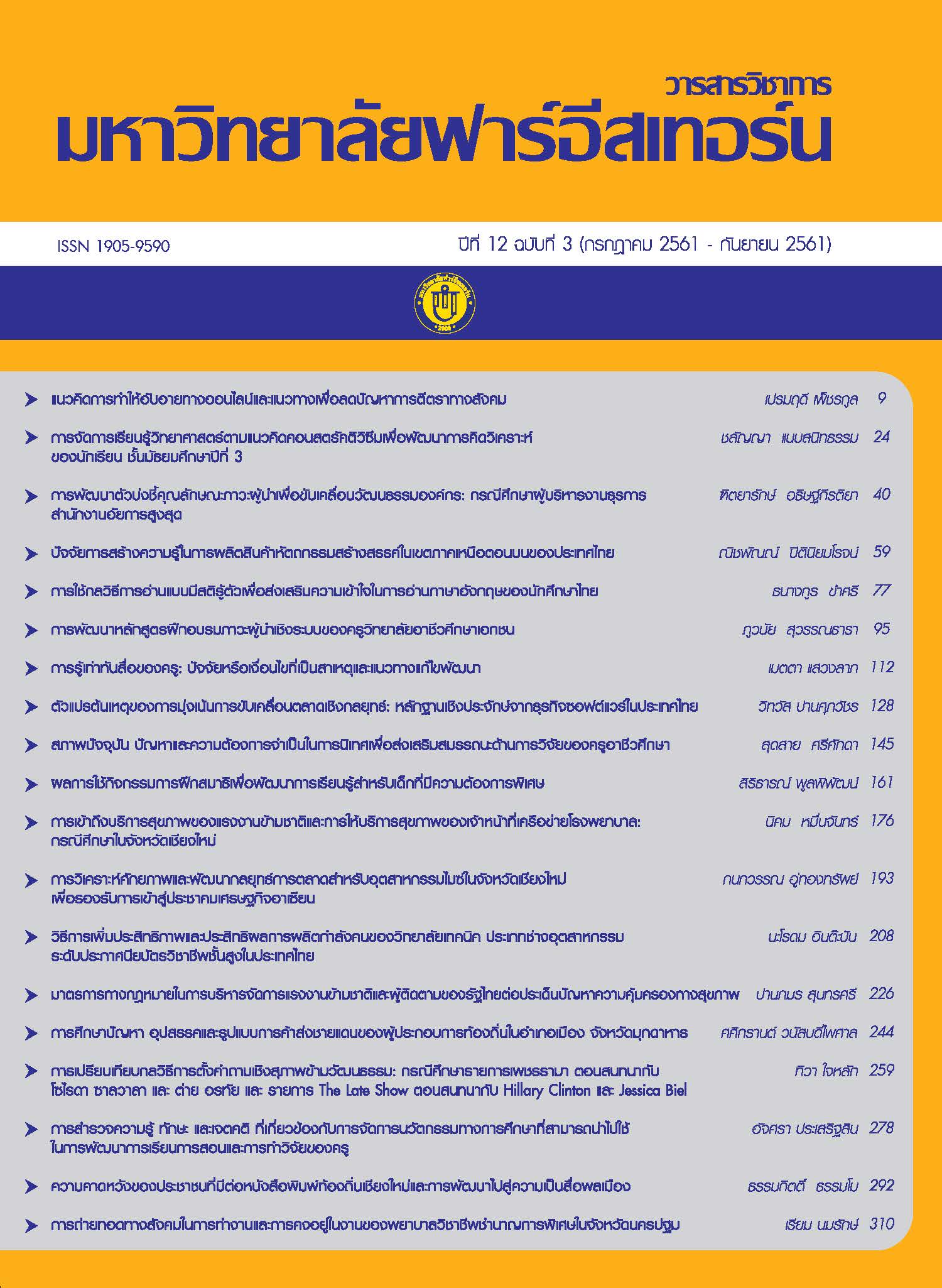The Use of Mind Oneself Reading Strategy (MORS) to Enhance Thai Students’ English Reading Comprehension
Main Article Content
Abstract
บทคัดย่อ
การวิจัยครั้งนี้มีวัตถุประสงค์เพื่อสำรวจตรวจสอบถึงผลกระทบของการใช้สมาธิที่มีต่อความเข้าใจในการอ่านของนักศึกษาไทยในระดับมหาวิทยาลัย ในการศึกษาครั้งนี้ได้รับการออกแบบมาจากปัญหาการอ่านที่โดดเด่นจากนิสัยการอ่านของนักเรียนไทย คือ การขาดสมาธิในการเรียนและการอ่าน จากการวิเคราะห์ข้อมูลพบว่านักเรียนที่ฝึกฝนสมาธิโดยการนั่งสมาธิสามารถพัฒนาความเข้าใจในการอ่านโดยมีคะแนนทดสอบหลังการอ่านภาษาอังกฤษเพิ่มขึ้นโดยมีคะแนนเฉลี่ยอยู่ที่ 16.14 ส่วนเบี่ยงเบนมาตรฐานอยู่ที่ 3.57 ขนาดของผลกระทบมีขนาดปานกลางผลคือ 0.37 และมีค่าความเชื่อมั่นที่ระดับ 0.01
Abstract
The purpose of this research was to investigate the effects of Mindfulness Reading Strategy (MORS) on Thai university students’ reading comprehension. This study was designed based on the prominent reading problems of Thai students’ reading habits which was the lack of concentration while studying and reading. The analysis of the data shows the
following results that the students who practiced mindfulness concentration by sitting meditation could improve their reading comprehension as shown in their English reading comprehension Post-test (M = 16.14, SD = 3.57) with a medium effect size (0.37) at the 0.01 confidence interval level.
Article Details
1. Any views and comments in the Journal of Social Innovation and Lifelong Learning are the authors’ views. The editorial staff have not to agree with those views and it is not considered as the editorial’s responsibility.
2. The responsibility of content and draft check of each article belongs to each author. In case, there is any lawsuit about copyright infringement. It is considered as the authors’ sole responsibility.
3. The article copyright belonging to the authors and The Far Eastern University are copyrighted legally. Republication must be received direct permission from the authors and The Far Eastern University in written form.
References
Alderson, J.C. & Urquhart, A.H. (Eds). (1984). Reading in a Foreign Language. London:
Longman
Anderson, N. J. (2003). Teaching reading. In D. Nunan (Ed.), Practical English language
teaching (pp. 67-86). New York: McGraw-Hill
Anderson, R.C., & Pearson, P.D. (1984). A schema-theoretic view of basic process in reading
comprehension. In P.L. Carrell, J. Devine & D.E. Eskey (Eds.), Interactive Approaches
to Second Language Reading, 37-55. New York: Cambridge University Press.
Anusornnarakarn, W. (2002). Problems in reading comprehension. Master’s Thesis. Yala
Rajabhat University.
Brett & Kate McKay. (2014). Your concentration training program: 11 exercises that will
strengthen your attention. Retrieved July 18th, 2015 from
https://www.artofmanliness.com/2014/01/30/your-
concentration-training-program-11-exercises-that-will-strengthen-your-attention.
Chinwonno, A. (2001). A comparison of Thai and English reading comprehension
strategies of preservice teachers in Thailand. Doctoral Dissertation. Ohio University.
Congleton, C., HÖlzel, B. K., & Lazar, S. W. (2015). Mindfulness can literally change your brain.
Harvard Business Review. Harvard Business Publishing. Retrieved June 16, 2015, from
https://hms.harvard.edu/sites/default/files/assets/OCER/files/Harvard%20Now%20and%20Zen%20Reading%20Materials.pdf
Cortazzi, M. & Jin, L. (1999). Cultural mirrors: materials and methods in the EFL
classroom. In E. Hinkel (ed.), Culture in second language teaching (pp. 196-219).
Cambridge: Cambridge University Press.
Gonzalez, M. (2014). Mindfulness for people who are too busy to meditate. Harvard
Business School Executive Education. Harvard Business Publishing
His Holiness Somdet Phra Nyanasamvara the Supreme Patriarch. (2008). Basic
principles of meditation. Retrieved September 28, 2015, from
https://www.dharma-gateway.com/monk/preach/somdej/somdej-02.htm
Lazar, S. W., Kerr, C., Wasserman, R. H., Grey, J. R., Greve, D., et al. (2005).
Meditation experience is associated with increased cortical thickness.
NeuroReport, 16. 1893-1897
Luangphor Viriyang Sirintharo. (1999). The path to success. Willpower Institute. Pra
Cha-Chon Co., Ltd. Bangkok, Thailand
Luders, E., Toga, A., W., Lepore, N., & Gaser, C. (2009). The underlying anatomical correlates
of long-term meditation: Larger hippocampal and frontal volumes of gray matter. NeuroImage, 45, 672-678. Retrieved Dec 18, 2012 from www.dbm.neuro.uni-jena.de/pdf-files/Luders-NI09.pdf
Maierbrugger, A. (2016). Smartphone-Crazy Thailand’s growing problem with online
junkies. Investvine Southeast Asia’s Business News Site. Retrieved
September 7, 2017, from https://investvine.com/smartphone-crazy-thailands-growing-problem-with-online-junkies/
Medalia, A. & Revheim, N. (2012). Dealing with Cognitive Dysfunction Associated with
psychiatric disabilities. A handbook for families and friends of individuals with psychiatric disorders. Retrieved July 19th, 2015 from https://www.omh.ny.gov/omhweb/cogdys_manual/CogDysHndbk.htm
Montessori, M. (1936). The Secret of Childhood, Ballantine Books
Mrazek, M. D., Franklin, M.S., Phillips,D.T., Baird,B., & Schooler, J.W. (2013).
Mindfulness Training Improves Working Memory Capacity and GRE Performance While Reducing Mind Wandering. Journal Psychological Science, 1-6
Nuttal, C. (1996). Teaching reading skills in a foreign language. Oxford: Heinemann
ONEC. (2014). English proficiency index. Retrieved June 26, 2015, from
https://www.m-society.go.th/article_attach/11993/16255.pdf
Phra Brahmagunabhorn (P.A. Payutto). (2012). Khumue Chiwit. Bangkok: Amarin
Printing and Publishing Public Company Limited
Rattanawanitpun, S. (1999). A Study of Thai University Students' Ability to Use Multiple
Standards to Evaluate Their Comprehension of Expository Texts in English. Doctoral Dissertation. Southern Illinois University
Rusbult, C. (1989) Effective Learning Skills: memory, concentration, reading & listening,
exams, time use. Retrieved June, 26, 2015 from https://www.asa3.org/ASA/education/learn/203.htm#204
Shapiro,S. L., Brown, K. W., and Astin, J. A.(2008). Toward the integration of meditation into
higher education research. Mindfulness in Education Network website
Sucompa, S. (1998). A survey study of current needs and problems in using technical English for tourism for the Higher Certificate level students of Rajamangala Institute of Technology. Master’s Thesis. Mahidol University
Williams J. M. G., Teasdale J. D., Segal Z. V., & Kabat-Zinn J. (2007). The mindful way
through depression: Freeing yourself from chronic unhappiness. New York: Guilford

